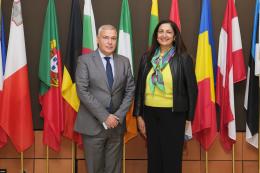European Economic
and Social Committee
Transatlantische Beziehungen
Demokratie, Menschenrechte sowie wirtschaftliche und politische Freiheiten sind gemeinsame Werte der EU, der USA und Kanadas, die zudem gemeinsame außen- und sicherheitspolitische Anliegen haben. Die USA und Kanada gehören darüber hinaus zu den wichtigsten Handelspartnern der EU und sind auch Partner bei der Gestaltung der internationalen Rechtsordnung. Das Umfeld für die transatlantischen Beziehungen der EU hat sich in jüngster Zeit gewandelt, und diese sieht sich wachsenden Herausforderungen gegenüber. Nach Auffassung des EWSA gewährleistet die Einbindung der Zivilgesellschaft in diese Beziehungen, dass die transatlantischen Beziehungen den Erwartungen der Öffentlichkeit gerecht werden und wirksam zur Gestaltung einer Zusammenarbeit zu beiderseitigem Vorteil beitragen.
Das umfassende Wirtschafts- und Handelsabkommen EU-Kanada (CETA) und das Abkommen über eine strategische Partnerschaft wurden am 30. Oktober 2016 unterzeichnet. Bei der Umsetzung dieser Abkommen strebt der EWSA eine laufende Einbindung der Zivilgesellschaft an. Die Verhandlungen über eine transatlantische Handels- und Investitionspartnerschaft (TTIP) zwischen der EU und den USA sind derzeit ausgesetzt. Nichtsdestotrotz haben die TTIP-Verhandlungen dazu beigetragen, die Kontakte zwischen der Zivilgesellschaft der EU und der USA zu stärken und deren Standpunkte zur Gestaltung der künftigen Handelsbeziehungen zwischen der EU und den USA aufzuzeigen. Das, was hier geleistet wurde, darf nicht verloren gehen. Der Begleitausschuss Transatlantische Beziehungen wurde im September 2014 eingerichtet, um die transatlantischen Beziehungen zur Zivilgesellschaft zu begleiten und einen regelmäßigen Dialog und Konsultationen zu Fragen im Zusammenhang mit den Beziehungen zu den USA und Kanada zu gewährleisten.



